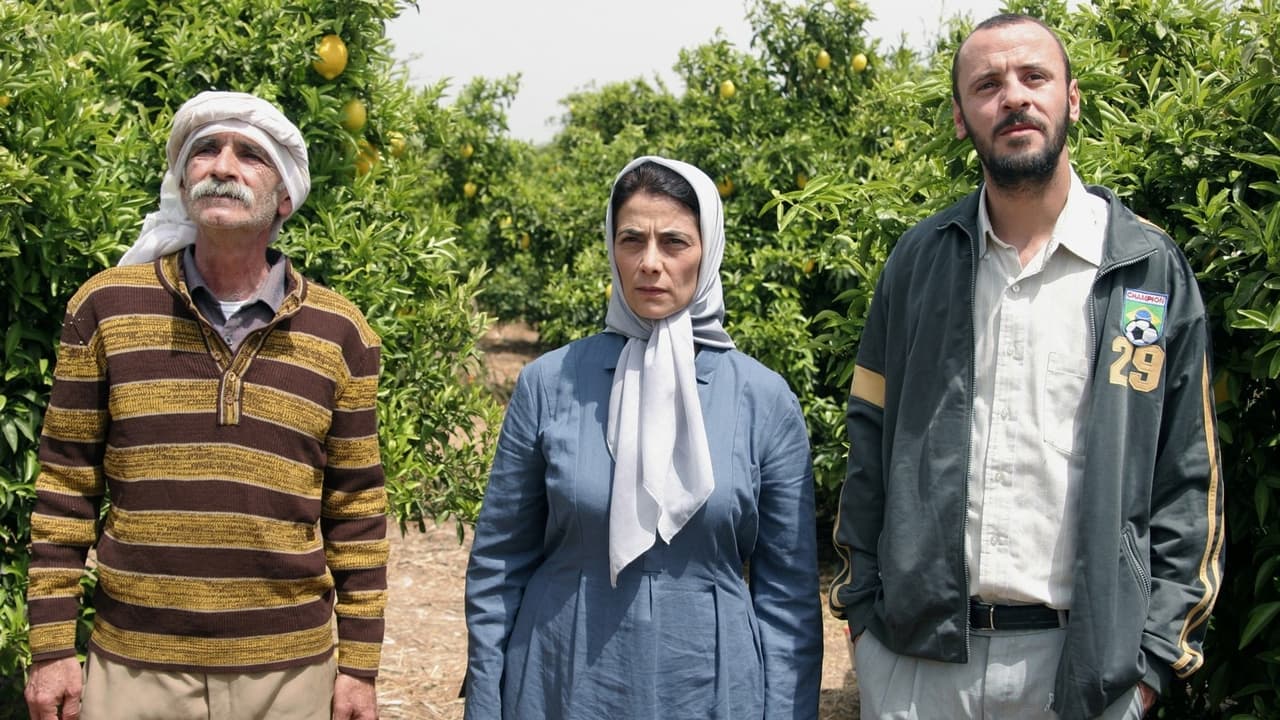

Dreadfully Boring
... View MoreIn truth, any opportunity to see the film on the big screen is welcome.
... View MoreThere are moments that feel comical, some horrific, and some downright inspiring but the tonal shifts hardly matter as the end results come to a film that's perfect for this time.
... View MoreAn old-fashioned movie made with new-fashioned finesse.
... View More" Lemon Tree" is a beautifully told story about the life in Israel. In order to assure security of the new house of the minister of Defence, the state orders that the lemon grove that belongs to a Palestinian widow next door has to be cut down. Lets not have silly notions about justice and democracy. How could the unimportant lonely women win? The bigger issue at stake here is how absolutely helpless her position is. Between oppressive Israeli regime and equally oppressive conservative, patriarchal Muslim culture, she had to be squashed. In the filthy game of politics average people and their unimportant needs never stood a chance. Here or there.
... View MoreThis was a real horror story, thankfully with no gore, but more chilling that those that do. Set in the Green Line, a Palestinian widow tends her inherited lemon grove with the help of an old neighbour. Her children have left home, the son working an a restaurant in Washington. The Israeli Defence Minister buys a house the other side of the chainlink fence marking the green line. He has a pleasant view over the lemon grove. However, security regard the grove as a security threat and order it to be cut down. The woman is helpless against the Israeli army, and the Minister defends the decision on grounds of having to follow security advice. The gutless Palestinian community tell the widow not to bother to fight the system, but not to accept compensation either: Palestinians don't. A young lawyer agrees to help, and they become friendly as the case progresses through the system. However, the elders of the community tell the widow that she is dishonouring her late husband's name, as is her son by being in America. A razor wire fence is put up with a goon tower, and then another fence to cut the widow off from the trees, which begin to wither and die. Meanwhile the Minister has an affair with his secretary, while his wife sits imprisoned at home with only the secret service for company. Any attempt she makes to contact the widow is quickly scuppered, and it is made clear that such attempts will damage her husband's career. Finally the Supreme Court decides that only half the trees must be grubbed out, the other half being cut back to their roots. Of course, in the end nobody wins: the Minister and his wife break up, the widow moves out, and the Minister is faced with a huge security wall at the bottom of his garden hiding the view of the devastated grove. It was a film with realism oozing out of it, and one out of which nobody, except the woman, emerged with any credit. A typical example of the situation was when the authorities write to the widow to say she must move: their letter is in Hebrew, and she only speaks Arabic. This was high order film making.The legal position was interesting: at one stage the lawyer cites international conventions (I forget which) which say that occupying forces should not damage private property. The Israeli military counsel counter by saying that there is a get-out for urgent military necessity. It struck me that as the Minister had moved into the house knowing the grove was there, he could hardly claim urgent military necessity to remove it. The lawyer also didn't note that whilst the grove had been there fifty years, there was no guarantee how long the Minister intended to stay in his property.
... View MoreEtz Limon (2008) directed by Eran Riklis, was shown in the United States with the title "Lemon Tree." (Don't confuse the film with a popular novel that has the same title.) The plot of the story is simple enough. The Israeli defense minister moves into a home located right next to a lemon grove owned by a Palestinian woman. Israeli security agents decide that the grove presents a hazard to the minister and his wife, and declare that the lemon trees must be destroyed. The Palestinian woman fights the destruction of her livelihood and her legacy.Although the basic plot of "Lemon Tree" is simple, the movie is complex. There are fascinating interactions between the woman--Salma Zidane, played by the incomparable Hiam Abbass--and her lawyer and her children. The defense minister has a edgy relationship with his wife. (His wife is basically a fair and caring woman, and isn't supportive of the grove's destruction, but she also likes being married to a powerful, charismatic public figure.) The defense minister is obviously very close to a beautiful young aide, and the movie suggests that they're having an affair.Although the film is clearly sympathetic to the Palestinian cause, all of the Palestinians aren't portrayed as perfect individuals. One local Palestinian leader doesn't suggest any course of action for Salma, but warns her not to accept compensation from the Israelis. Refusal to accept compensation probably makes sense as a political strategy. However, without compensation, what options are open to a widow whose sole livelihood is taken from her?To me, the saddest part of the movie was the failure of Salma and the minister's wife Mira (Rona Lipaz-Michael) to ever meet face to face. On several occasions in the film they almost meet, but the meeting never actually takes place. Symbolically, that failure to communicate on a personal level represents the Israeli-Palestinian dilemma. They are figuratively and literally unable to speak to each other, and therefore they can never move beyond stereotypes and hostility.We saw this film at the excellent Rochester Jewish Film Festival. However, it would work well on the small screen. It's an extraordinary film, and definitely worth seeking out.
... View More"The Lemon Tree" is a picture that deals with a "hot" subject in low-key, human terms, but fails to really connect on a human level. The leads all deliver solid performances but they don't have much to work with. Characters are drawn in subtle sketches, but the sketches fail to hint at anything other than sketches and there is less subtext than the dialogue's minimalism would suggest. The film attempts to draw parallels between the alienated Israeli minister's wife and the alienated Palestinian widow, but both characters are too passive to create any real drama and neither of them really change. The film even goes as far as to avoid showing on screen some of the characters' pivotal moments, which suggests that the writer-director didn't know his characters well enough to show us how they would behave. A film which appears to be about women on the sidelines of a conflict proves itself to be more about women who are on the sidelines of life itself, but it seems to believe it is making a statement about the nature of national conflicts. Politics kept this viewer interested during the film's short running time, but, politics aside, the film is a minor exercise in the display of pretty actresses and Judean landscapes. Pretty actresses and Judean landscapes nearly make this film worth the price of admission but in a year when Israel also produced "Waltz With Bashir," this one should barely register.
... View More